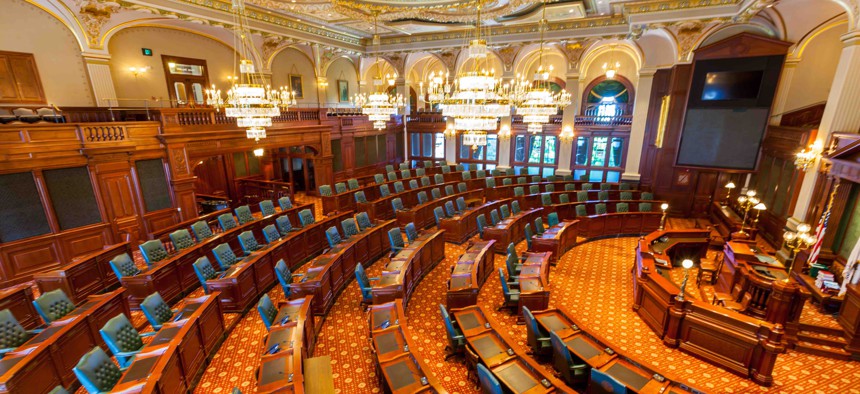State Government Civics Survey Leaves Many People Stumped

Interior of the Senate Chamber of the Illinois State Capitol in Springfield, Illinois. shutterstock

Connecting state and local government leaders
A striking number of respondents couldn't answer questions about their elected officials, or the mechanics of state government.
Americans may need to brush up on their knowledge about state government, the results of a new survey suggest.
Researchers at Johns Hopkins University released findings Tuesday showing a striking share of the 1,500 survey participants were unable to answer relatively basic questions on the subject, like who their governor is and what their state legislature has been focused on.
"The lack of understanding of state issues and state politics is so deep that we're concerned that citizenry is precluded from engaging with state government," said Jennifer Bachner, a political scientist at Johns Hopkins who is involved in the study.
At least one-third of respondents said they did not know the name of their governor, while at least 81 percent could not name their representative in the state legislature, and no fewer than 72 percent could not name their state senator.
Just over one-quarter of survey participants said they didn't know if voters elected officials in their state other than the governor, lieutenant governor, and members of the legislature.
Meanwhile, about 80 percent said they did not know the "most debated issue" in their state legislature this year and nearly half said they follow state or local politics "only now and then" or "hardly at all."
Despite these knowledge gaps, 59 percent of respondents said their overall opinion of their state government is either "mostly" or "very" favorable, and 69 percent said they thought their state government does a better job than the federal government serving citizens.
Bachner said that for some people "state pride" could translate into favorable opinions about their state government.
As for what's to blame for the limited grasp of state affairs seen in the findings, Bachner says one factor is ineffective civic education. "The way it's being taught is simply not working well enough," she said.
She also pointed to a collapse of news coverage in state capitals in an era when many newspapers are struggling.
This week's release focused on initial highlights from the online survey, which was conducted in October, and Bachner said there are plans to comb through the responses more closely in the months ahead.
The way some of the questions were posed, and the information in the immediate findings, could actually understate how many people couldn't provide correct answers.
For example, in responding to the question "Who is your state governor?" people could select, "don't know," which 33 percent of them did. Or they could enter their governor's name.
A quick skim through the responses shows that at least a handful of them are incorrect, like "Mario Cuomo," "Nikki haily" and "Trump."
One question where people fared better providing correct responses had to do with elections: 90 percent of respondents said "yes," when asked if citizens in their state are required to register before voting.
But when asked whether their state allowed ballot initiatives, which have been instrumental in policies having to do with issues ranging from marijuana legalization, to taxation, to the environment, 53 percent of people said they did not know.
Bill Lucia is a Senior Reporter for Government Executive's Route Fifty and is based in Washington, D.C.

NEXT STORY: A Guarantee of Tuition-Free College Can Have Life-Changing Effects





